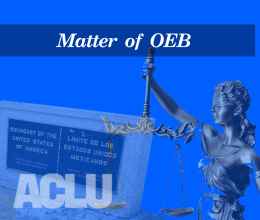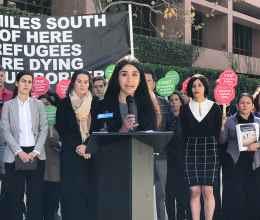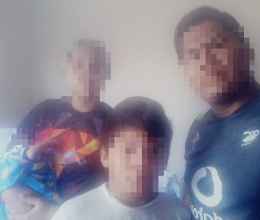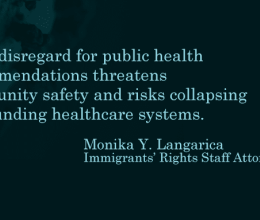SAN DIEGO and PHOENIX – In order to make America’s border agencies more accountable to the laws that protect us all, the American Civil Liberties Union (ACLU) today announced the launch of a new Border Litigation Project to investigate, document and litigate civil and human rights cases along the U.S.-Mexico border. The new initiative will allow the ACLU to increase its legal capacity along the Southwest border by hiring two new full-time staff attorneys in San Diego and Tucson.
Today’s announcement comes as the Senate prepares to engage in lengthy floor debate over a proposal to reform the nation’s immigration laws. The proposed legislation would implement new, costly border security measures ranging from hiring additional border patrol agents to expanding Operation Streamline, a program in the Tucson-sector that prosecutes people en masse for unlawful entry into the United States.
“In the last eight years, as spending levels along the U.S.-Mexico border have increased dramatically, there has also been a significant increase in human and civil rights violations stemming from the lack of oversight of U.S. Customs and Border Protection,” said Alessandra Soler, executive director of the ACLU of Arizona. “For more than 90 years, the ACLU has worked to ensure that everyone in the United States enjoys the constitutional guarantees of due process and fair treatment. These long-standing legal protections must be defended for all people living and working in our border communities.”
The new initiative will allow the ACLU of Arizona, for the first time, to have one staff attorney in Tucson who will work exclusively on border-related issues.
The ACLU has responded to the increase in the number of serious abuses by U.S. Customs and Border Protection (CBP) and other federal agencies working along the U.S.-Mexico border by enhancing its presence in the region. In 2006, the ACLU of New Mexico founded the Regional Center for Border Rights, and, in 2011, the ACLU of Texas opened an office at the border in Brownsville.
“With the ACLU’s Border Litigation Project, we hope to address the root causes of abuse at the border—lax legal standards, lack of accountability and oversight, and a culture that has tolerated impunity for misconduct,” said Kevin Keenan, executive director of the ACLU of San Diego. “For the ACLU, the project also represents another important innovation in cross-affiliate collaboration,” that has drawn the attention of national foundations as well as elected officials across the country.
In recent years, ACLU staff in Texas, New Mexico, San Diego and Arizona have collaborated in joint advocacy as the “ACLU’s Southwest Border Affiliates.” In May 2012, the groups filed a joint complaint with the Department of Homeland Security Office of Civil Rights and Civil Liberties and Office of Inspector General to document 13 serious incidents of CBP abuse at ports of entry, including a May 2010 incident involving Anastasio Hernandez-Rojas, a 42-year-old construction worker and father of five who died after being beaten and then shocked by a Taser by a group of CBP officers at the San Ysidro port of entry. The complaint also cited the tragic death of Sergio Adrían Hernández Güereca, a 15-year-old boy, who was fatally shot by a CBP officer in June 2010 after reportedly throwing rocks at officers near the El Paso port of entry.
The Border Litigation Project is made possible by a three-year, $450,000 grant from the Price Family Charitable Fund in San Diego. Mitra Ebadolahi, an attorney previously with the ACLU National Office, began work on May 1 as the project’s new border litigator in San Diego. The Tucson position is being funded by a two-year, $300,000 grant from the Central America and Mexico Migration Alliance (CAMMINA), founded by Ford Foundation, Open Society Foundations, and Fundación AVINA, and will be staffed by ACLU of Arizona staff attorney James Duff Lyall, beginning in June. CAMMINA’s mission is to advance the rights of migrants and contribute to the economic sustainability of communities through long-lasting policy changes, making migration a choice rather than a necessity. Both grants include resources for contract services to conduct in-depth investigations on border abuses and to organize meetings of strategic litigators and advocates focused on border issues.
“The success of this project will depend in large part on our ability to build strong working relationships and alliances with groups on both sides of the U.S. Mexico border,” added Soler. “Given the increased presence of both direct service providers and advocacy organizations along the border, coordination and collaboration will be critical, allowing us to learn from one another and develop best practices when it comes to information-sharing, communications and abuse documentation. Most importantly, though, collective brainstorming with groups in the U.S. and Mexico will help us develop concrete short- and long-term strategies that in the end will help us make an even greater impact.”
###
Biographies of Border Litigation Project Attorneys
James Duff Lyall (started in Tucson on June 12, 2013) joined the ACLU as staff attorney in September 2011 and has specialized in civil rights litigation, including the ACLU’s prisoners’ rights and immigrants’ rights dockets. He is a former Georgetown Law Fellow at Esperanza Immigrant Rights Project in Los Angeles, where he provided pro bono legal representation to detained immigrants in removal proceedings. Subsequently, as Kids In Need of Defense (KIND) Law Fellow, he specialized in representing unaccompanied immigrant children in state and federal court proceedings, including Asylum and Special Immigrant Juvenile cases. Prior to joining the ACLU, he served as a volunteer with No More Deaths in Tucson, where he co-authored Culture of Cruelty, a report documenting widespread Border Patrol abuse along the U.S.-Mexico border. Lyall is a native of Massachusetts and a 2007 graduate of the Georgetown University Law Center, where he completed a certificate program in Refugees and Humanitarian Emergencies.
Mitra Ebadolahi (started in San Diego on May 1, 2013) was the inaugural Nadine Strossen Fellow with the ACLU’s National Security Project in New York. Her areas of expertise include: constitutional and administrative law and litigation, particularly in the areas of immigrants’ rights and racial justice; international human rights law, especially economic and social rights; national security law and policy; and FOIA requests and litigation. After attending UCLA as an undergraduate and the London School of Economics as a U.S.-U.K. Fulbright Scholar, Ebadolahi completed her legal studies (JD ’08, LL.M. ’11) at New York University School of Law. While at NYU, she was a Root-Tilden-Kern/Filomen D’Agostino Scholar and an Institute for International Law and Justice/Hugo Grotius Scholar. Following graduation, Ebadolahi clerked for Judge Betty B. Fletcher of the Ninth Circuit Court of Appeals in Seattle, Washington and for Judge Margaret M. Morrow of the U.S. District Court for the Central District of California in downtown Los Angeles, California.








